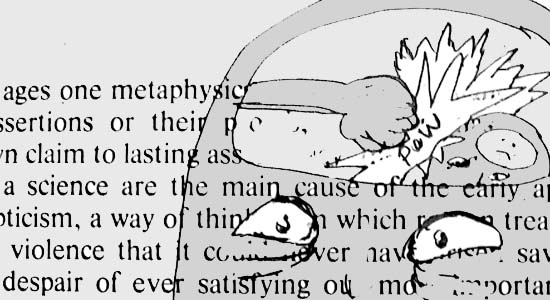
|
Lorna Mills and Sally McKay
Digital Media Tree this blog's archive OVVLvverk Lorna Mills: Artworks / Persona Volare / contact Sally McKay: GIFS / cv and contact |
View current page
...more recent posts
Steve Reinke launched a new book last night in Toronto. I've been a fan of his since I saw "The Hundred Videos" (which was just like it sounds) at the Power Plant in 1997. At the launch Reinke and Mike Holbloom (a Toronto filmmaker and longtime collaborator with Reinke) chatted on stage, and then screened some video. Reinke is deadpan in the extreme. His style has elements in common with both autism and psychosis, as he inhabits a voice that is clinical, abject and detached, while working with "hot" sexual and emotional content. This presence made for a great screening, and an awkward interview. Hoolbloom seemed to be pushing for a kind of boyish intimacy in his questions and Reinke's responses came across, in parts, as evasive and coy. It's my impression, however, that despite appearances Reinke is completely sincere. When asked why he is interested in Jeffrey Dahmer, his response "It's not so much the cannibalism as the zombification" could be taken as a quip (I admit that I guffawed), but it also bears the mark of much consideration.
In the interview, Hoolbloom prodded at Reinke's obvious lineage to Vito Acconci, for which I was grateful. Reinke's favourite Acconci video is also my favourite, Theme Song, in which Acconci is lying on the floor, smoking cigarettes and looking into the camera, attempting to seduce the viewer to join him. His voice silky and drowsy, his body spooning and curling on the rug, he tirelessly croons, "Come in here with me... I know you want to, come on in. Just come on in." The EAI catalogue describes this work as "perversely intimate" which applies as easily to Reinke.
Video itself comes across as perverse in Reinke's work. This is a world in which we can take pictures of anything at any time. His oeuvre ranges between sophisticated graphic animations to hand-held home-style footage, but always there is a narrative of investigation, as if every single thing in the world, including our own shames and desires, is an object to be picked up and turned over. And, in a tragic existential tradeoff, this renders the world, while infinitely interesting, a lonely and alienating place.

| This image is from one of my favourite of Reinke's works, "Afternoon, March 23, 1999," in which he verbally describes his involvement with making balls of rubber bands and his interest in following their elucidatory trajectories as they bounce in unpredicatble patterns about the room. I took the image from this page at Nach Dem Film, where there is an excellent essay by Laura U. Marks. |


I obsess too much about artist-run centres. Here's an excerpt from something I wrote for Lola in 1997:
There is a common complaint that ARCs in Toronto have become "institutionalized." They were full of vim and vigour in the 1970s when artists first took over the bureaucracy and started setting the agenda themselves. But whether you are a politician, an artist, or a bank manager, red tape begets red tape. Founding members mature and the artists they choose to promote may be farther advanced in their careers. As an ARC's mandate evolves, new board members take up where the old ones leave off, and the process can't help but smooth out around the edges. It is hard to see how things could have happened any other way in a city with so many artists.
That was near the front edge of a generational watershed that I think is climaxing now. It's even more imperative that ARCs (or parallel galleries, as they used to be called) re-articulate their purpose, and do it in a language that inspires a new generation. Running an ARC is a ton of work. It requires a dedicated volunteer board with enthusiasm for the future and a vision for the programming. It requires staff who feel invested enough in the institution to put in extra hours making art shows happen on a shoestring. It's a team effort that, when it works, works great. But inspiration is required and that inspiration seems to be in short supply. Institutions change internally and so does the cultural climate around them. In the 1970s artists needed ARCs because there was nowhere else to show their work. It was a let's-put-the-show-on-right -here-in-the-barn mentality that drove the long hours and creative solutions to systemic and structural problems. Now there's a sort of entrenched misery, a doom and gloom attitude that we will all volunteer our energies, even if its no fun at all, to maintain a system that has become integral to visual art production in this country. But why? What is so important about artist-run centres now? I will pose some of my own responses to this question over the next few days, and I certainly hope, if there is anybody out there reading this, that others will too.

My current goal is to post here once a week, at least until November when things are bound to ease up work-wise. Tom Moody is posting like crazy! That guy is a damn good blogger, go read it. Also, Bikenerd is going strong. I am not going strong blog-wise, but I am still going. This post represents excerpts from my ongoing project of illustrating Kant's Prolegomena to Any Future Metaphysics That Will Be Able To Come Forward As Science (I like the full title best). It's really really hard. I've been working on it off and on for about four years and I'm only halfway through the second section, "First Part of the Main Transcendental Question."

while this blog may be floundering at the moment, slipped into the crack between too much work and summer fun, the Prereviews are going strong and have even introduced a new point/counterpoint feature.